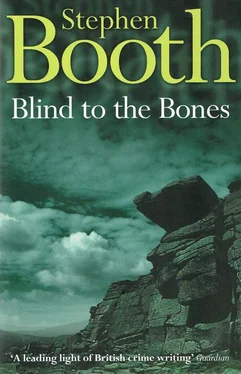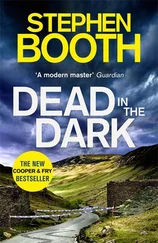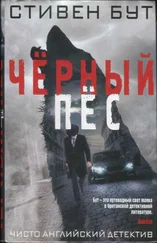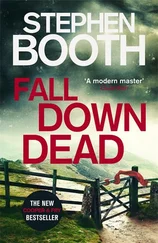‘Ah, well. It could still be useful.’
‘What do you mean?’
‘I’m thinking that it might be helpful if someone went over the ground again in Bearwood. You know that ground, Fry. You’re from that area.’
‘Yes, sir,’ said Fry reluctantly.
‘You don’t have a problem with that, do you? No personal problem, I mean.’
‘No.’
‘Mr Kessen has read your personnel file, so if you feel...’
‘There’s no problem, sir.’
‘Good, good. Who will you take with you? We have Ben Cooper back with us. That’s what you wanted, isn’t it, Diane?’
Fry looked at the face of her senior officer, and thought about taking Ben Cooper with her to her old childhood haunts. He was the only one here who had any idea of what had happened to her during her childhood in Warley, or had any inkling of the existence of the sister she was still looking for after all this time. Cooper would be sympathetic. He would allow her time to visit places that had no relevance to the enquiry, without asking difficult questions. He would understand. He would be willing to listen, if she felt she wanted to talk about it. And he wouldn’t think any worse of her if she wasn’t able to maintain a professional exterior but showed her emotions, even broke down and cried. He would probably think better of her. He might even encourage her. All the things she didn’t want.
‘I’ll take Gavin Murfin,’ she said, and sighed when she thought of the newly pristine state of her car.
Neil Granger’s house was in the middle of a terraced row on the main road through Tintwistle. At one end was a small Congregational chapel, where some women in hats were just leaving from a side door, perhaps from an evening service or a ladies’ group meeting.
The row of houses had been clad with stone and modernized piecemeal. Many of the upper windows had been replaced with modern aluminium-framed versions, yet one house still had a cluster of little mullioned windows. Someone had built a low wall to separate the house from the pavement. It achieved little else, being too narrow for anything but a bit of concrete and a plastic tub containing some dead geraniums. The wall had been constructed from imitation stone, topped by pre-cast concrete blocks that formed diamond shapes, and there was a black wrought-iron gate.
Inside the gate, the flagstones were covered in a layer of dead leaves, which no one had bothered to clear away from the previous autumn. The house to the right had a neat garden and empty milk bottles left on the step for the milkman. To the left, there was a door painted in vibrant green and purple, while the windows had been edged in equally bright red. A small, yellow smiley face had been attached to the fanlight over the door. Ben Cooper wondered what sort of people lived there. Not one of the old ladies from the chapel, surely?
‘I don’t know what to do. I suppose that I’m Neil’s next of kin.’
Philip Granger looked pale and ill. But the impression was perhaps exaggerated by the blackness of his hair and the dark stubble on his cheeks. He gazed around him in a daze, as if he wasn’t quite sure where he was, or who these people were that he was with.
‘Yes, sir,’ said Cooper. ‘But there are people who will give you advice and support. There will have to be an inquest first, anyway.’
Police officers had collected Granger from his job at an industrial insulation factory on the outskirts of Glossop, where he had been approaching the end of a long shift. Cooper could see that he was tired, and still in a state of shock from formally identifying his brother’s body. They had been lucky to get an ID confirmed so quickly, and to get access to his brother’s house. But Philip Granger wasn’t going to be much more use to them until the reality of Neil’s death had a chance to sink in properly.
Cooper watched him pick up some letters that had been lying in a wire basket behind the letter box. He looked at his brother’s name and address typed on them, frowned, and put them down on the window ledge. Then he picked them up again, shuffled through them, and put them back in the wire basket with a guilty look, as if deciding that he shouldn’t have touched his brother’s mail.
‘Do you live nearby, sir?’
‘In Old Glossop, not far from the factory where I work.’
‘So I take it you’ll have visited this house sometimes, sir?’
‘Yes, of course.’
‘And have you travelled in your brother’s car? The VW?’
‘Once or twice. Why?’
‘We’ll need to take your fingerprints, for elimination purposes.’
Granger just stared at him blankly.
‘Tomorrow will do, sir. When we get a formal statement.’
‘Yes. Whatever.’
The house was sparsely furnished, without much effort to make everything match perfectly — but it was no more than he would have expected from a man living on his own. There was a stereo with sizeable speakers in the sitting room, and a TV in the other corner, with a remote sitting on an arm of the settee.
‘Did you help Neil move in?’ asked Cooper.
‘Yeah. The furniture is a bit of a mixture. Some of it he was given, some he bought second hand. There were some new things. The stereo is new.’
Cooper walked over to the stereo and popped open the caddy of the CD. Nirvana. For some reason, he was surprised. But he didn’t really know much about Neil Granger yet. He turned back to Philip, who was standing staring vaguely at the remote control on the settee.
‘Are you sure there’s no one you’d like to call, who can be with you? We could get a doctor, if you’re not feeling well.’
‘No, I’m OK.’ But Granger sat down suddenly in one of the armchairs, as if his legs had failed him. ‘Actually, I could do with a stiff drink.’
‘We’ll try not to keep you too long.’
‘It’s all right. You want a statement, you said?’
‘Tomorrow. A formal statement tomorrow. But anything you can tell us right now to help us catch your brother’s killer quickly would be very helpful.’
‘I don’t know what to say.’
‘Had your brother lived here long?’
‘He only moved in last summer. He’d been working away for a while to save up for a deposit.’
‘It can be hard getting on the property ladder these days. Did he have a good job?’
‘He worked at Lancashire Chemicals after he came back to this area. They thought a lot of him there. He was earning more than me, anyway.’
‘Do you know how much he paid for this house?’
‘No, I can’t remember. Is it important?’
‘Don’t worry about it.’
It was something they could find out. Also what Neil Granger’s mortgage payments had been, in relation to his wages at the chemicals factory. Cooper wasn’t sure whether his curiosity on this was personally influenced. He knew all too well how difficult it was to get enough money together for a deposit on a house in Derbyshire and feel able to meet the mortgage commitment. It was taking him a long time on a detective constable’s salary, even after ten years in the force. But perhaps house prices in Tintwistle were lower than in desirable Edendale.
Cooper looked into the kitchen. Surprisingly clean and neat. Carpeted stairs started near the back door. He wondered where he should go about finding a diary, letters or an address book.
‘How many bedrooms are there?’
‘Oh, two,’ said Philip. ‘Neil has his computer set up in the small one.’
‘I see.’
It wasn’t a bad little house. It had been kept in good condition inside. It would be ideal for one or two people setting up for the first time.
Cooper went out into the back garden to look at the area where Philip said his brother had kept his car. There were distinct wheel marks in the ground, which the SOCOs could compare to the VW’s tyres, if it was thought useful. But there had been showers since Friday and the outline of the car had vanished.
Читать дальше
Конец ознакомительного отрывка
Купить книгу












